Taiwan triathlon star Shiao-Yu Li
When she was in high school in Taiwan, Shiao-Yu Li was hit by a motorcycle and left paralyzed. Her single mother didn't have money for medically supervised rehab, so on her own Li slowly regained the ability to move, walk and finally run again.
Starting in 2002, she embraced many sports including marathons, cycling races, ultra running, and adventure races. But when she started triathlon, she found her niche. In 2010, she won her 30-34 age group in Ironman China and qualified for the Ironman World Championship where she also placed 3rd in 30-34 and was 31st woman overall. After turning pro in 2012, she placed first woman overall at Ironman Japan in 2013 and 2014 and this year she took overall honors at Ironman 70.3 Japan. Pursuing her goal of qualifying for Kona as a pro, Li stands 47th in KPR rankings with 3,560 points, 1,100 points and 12 places short of a slot.
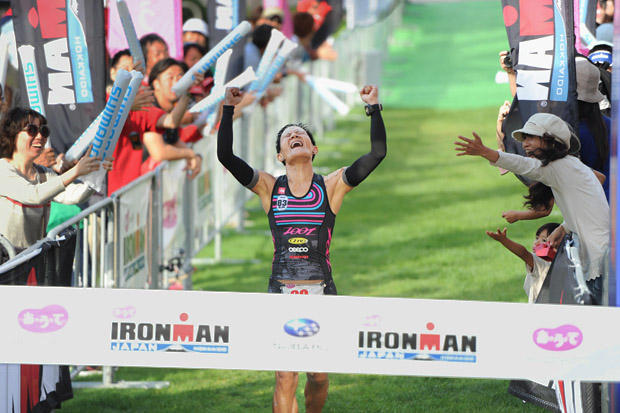
Li was chosen as one of “100 civilian heroes/heroines in Taiwan” by CommonWealth magazine. She is also the first female athlete invited by TedxTapei Women to give a speech encouraging people to fight for their dreams whatever their age.
This interview was translated by Shiao-Yu’s manager and friend Trisha Huey-Jun Chen.
Slowtwitch: You are known as the “big sister of triathlon in Taiwan.” What does that mean to you?
Shiao-Yu Li: I grew up in a very ordinary family in southern Taiwan. My identity is very “Taiwanese,” unlike some other great Chinese athletes who grew up or trained abroad. Although I prefer that people just call me by my name, this title gives me honor to make me train harder and improve. I hope my efforts and passion for triathlon can serve as a model for others because there has been really no example like me before in Taiwan.
ST: What societal barriers exist for female athletes in Taiwan?
Shiao-Yu: Sexual discrimination has been rooted in many Oriental cultures for a very long time; therefore, when my performance was better than men in my early racing, people would say I must take drugs or do something illegal. One reason is that I was an unknown – I did not have a coach or belong to a team when I started to race.
Another reason is that many couldn’t believe that a female could run faster than men. But I didn't get crushed by it, I just showed them again and again that a female could also be outstanding in sports. After my example, men and women started to have more respect for female athletes.
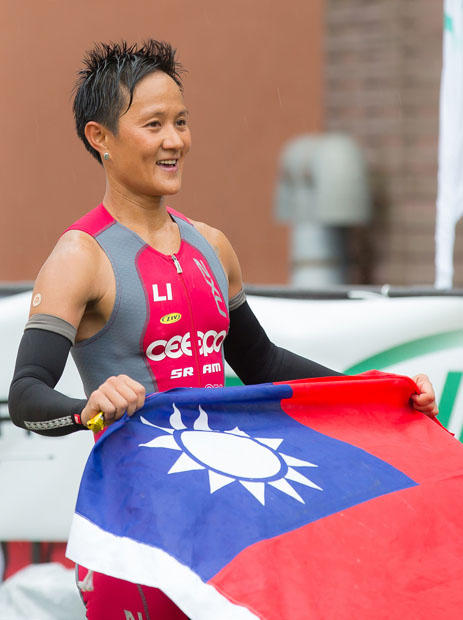
ST: Why are you proud to be a citizen of Taiwan?
Shiao-Yu: Taiwan is a tiny island but many cultures and people blend here quite well. Also it is the first and only place in the world where Chinese practiced democracy. I grew up in an area where we are free to express ourselves and choose our careers. Taiwan is a free, polite, and friendly place to live. Although it is small [23 million population, 13,000 square miles], it fosters creativity in literature and performing arts (such as the dance group Cloud-Gate and movie director Ang Lee), as well as innovators in the medical field.
ST: What are your feelings about China?
Shiao-Yu: I respect and value China, its culture and people. After all, our ancestors came from China and the South Asia. But I grew up in Taiwan and this is my motherland. I'm thankful for the nurturing and opportunities it has given me.
ST: What do you think about Taiwan’s CK Yang, who dueled Rafer Johnson at the 1960 Olympic decathlon?
Shiao-Yu: He won the first Olympic medal [silver] for Taiwan and we read about his story as children. Sometimes a great athlete can inspire his or her countrymen more easily than leaders in other fields.
ST: Did your family encourage you in sport?
Shiao-Yu: My father passed away when I was little and life wasn't easy for my mother. My older sister was on the school swimming team in elementary and junior high to save some tuition, and she received free meals, shoes and training clothes. I envied her traveling to other cities for races so I joined the team in elementary school as well. My mother didn't encourage me to do anything in particular, but she didn't restrict me either. My sister gave me some advice and help, but most of the time I was on my own and had a habit of running alone. Since I was little, when I was running, I felt free.
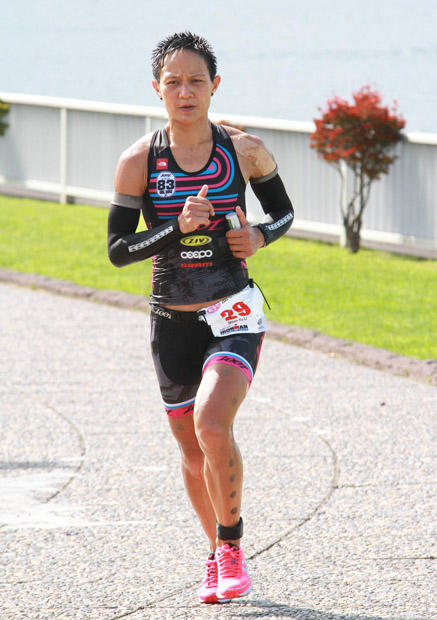
ST: Why did you like sports?
Shiao-Yu: I didn't have many friends and I wasn't very talkative when I started elementary school. My teacher actually thought I had autism. But in 4th grade, our P.E. teacher gave us a test to run 100 meters. To everyone’s surprise, including my own, I was the fastest. After that, my classmates started to talk to me, which was nice. But I skipped school often in junior and senior high. I was bored at school and spent a lot of time sleeping at home or out in the countryside by myself. I liked basketball for a while, but I liked running the most because I could do it alone. Whenever I felt down, I just went out and ran until I felt tired.
ST: You were critically injured when hit by a motorcycle in high school. What struggles did you face?
Shiao-Yu: In high school, I saw a marathon that started in my county and finished in another, and it inspired me to run to another county as well. One morning I started to run and just followed the road. Suddenly, I was hit from behind by a motorcycle and lost consciousness. When I woke up, I was in the hospital and I couldn't move. The doctor said my left side was paralyzed but he was unsure if surgery would help. My family didn't have much money, so I was sent home without knowing whether or not I would recover.
ST: How did you react when the doctor said you were paralyzed?
Shiao-Yu: I was in darkness and I cried every day. I was only 17, and I thought I would have to sit in a wheelchair for the rest of my life…
ST: I read that you felt hopeless and lost the courage to live. How did you keep fighting?
Shiao-Yu: Every time I tried to move, pain would extend from my spine to my head and down to my feet, often bringing me to tears. My family could not afford professional rehab, so I started my own program. I was very depressed and helpless, but I didn't want to be trapped in a broken body in a wheelchair for the rest of my life. One day I realized that if I could feel the pain, it meant my nervous system was not totally broken… If I started moving my muscles, in time there maybe I could stand again. Crying and trying to move a little became my routine.
ST: How did you progress?
Shiao-Yu: Little by little I began to move a bit more, and then I was able to sit up by myself. After a few months, I could put my feet on the floor. I didn't let my mom see my progress until one day I just started to walk around a little, and she was shocked…:)
ST: How did you come by your motto: “As long as you are still alive, you can overcome the difficulty.”
Shiao-Yu: Because of my determination to stand and walk out of that room, and the pain I endured, this accident made me realize how much potential our minds and bodies have!
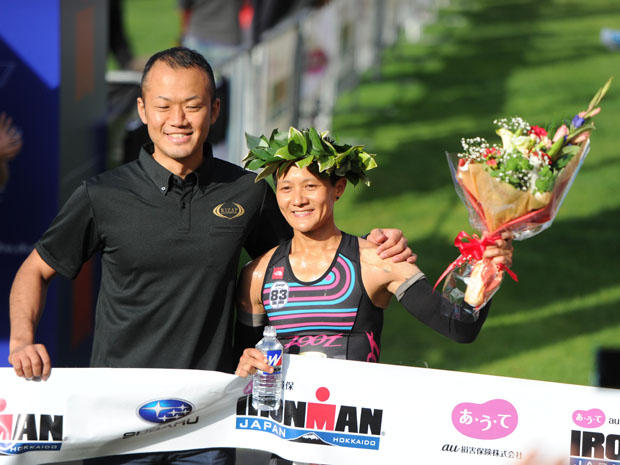
ST: What do you tell people in similar situations?
Shiao-Yu: If you want changes in your life, step out of your comfort zone. Believe in yourself instead of accepting limits placed on you by others. If I had believed my doctor, I might still be sitting in a wheelchair. Above all, don't be afraid to face pain and suffering – it will push you beyond your limits. Keep moving toward your goal and don't give up!
ST: Before you became a professional triathlete, how did you make a living?
Shiao-Yu: I was a fitness instructor. I taught combat boxing and spinning at the gym.
ST: What were some of your other athletic pursuits before triathlon?
Shiao-Yu: I won many cycling races in Taiwan, but I didn't like them very much because you rely on a team to win. Also, the traffic was dangerous. So I preferred ultra running, marathons and adventure races.
ST: What were the challenges of being one of the first female professional athletes in Taiwan?
Shiao-Yu: In Taiwan, no one can really live as a pro athlete except baseball and basketball players. Especially not a lone female athlete. When I told my friends I wanted to become a pro, they all said I was insane. One of my sponsors even said that my titles would look better if I continued to stay an age grouper – I could win every time! But I wanted to push myself. At first I didn't have enough money to support my professional career, and I didn't know much about sponsorships or public relations. So I asked my older sister Tammy Hsiao-Chuan Lee and her friend, Trisha Huey-Jun Chen, to help. Trisha is a successful commercial film director and she helped me make connections and find funding. They also went to races to watch and support me.
ST: With your success, have your sponsorships improved?
Shiao-Yu: Sponsorships in Taiwan are very difficult to obtain, especially for female athletes. Even now, after winning three pro championships and several other outstanding performances, my sponsorships are still less than I need. The three of us always struggle to find money.
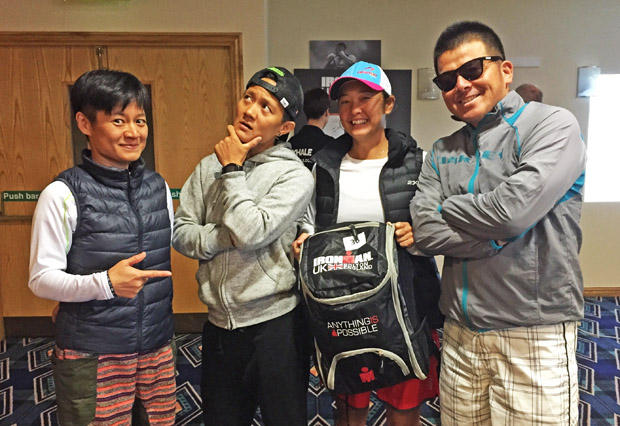
ST: In 2010 you were the 1st overall amateur woman at Ironman China and 5th overall woman behind four pros, including Amy Marsh and Nicole Leder. Tell us about that race.
Shiao-Yu: Some men in Taiwan told me it was impossible, but I was determined to qualify for Kona. Maybe it was impossible for them to qualify, but that didn't mean it was impossible for me! I trained for 3 months for Ironman China. I also won prize money at a big marathon a couple of months before and used it for travel expenses.
ST: How did that race go?
Shiao-Yu: I was 30 minutes behind after the bike, and I was angry that I was so slow. I told myself I could do this and I must go to KONA! It was a very hot day but I tried to maintain a good pace. I was in a lot of pain and I shouted at the sky a few times. Finally I saw my last competitor ahead and I knew I could pass her. It was a tough race and I cried as I approached the finish. Then I heard the announcer calling: “Shiao-Yu Li from Taiwan!” These words were very sweet.
ST: At the 2010 Ironman World Championship, you finished 3rd in the 30-34 age group in 9:59:33 and placed 31st woman overall. You beat several future top pros in 30-34 including Lucy Gossage, Caroline Gregory, Corinne Abraham, Beth Gerdes, Kendra Lee, Beth Shutt and Ultraman record holder Amber Monforte. Did you realize at the time how good that performance was?
Shiao-Yu: When I beat so many pros and future pros, I was astonished. I knew I was 30 minutes faster than Ironman China and I was happy with the improvement. I actually cared more about improving my own time than beating others. It was inspiring to see many disabled athletes. On the bike, when I was really tired, a disabled athlete rolling his bike with his hands told me to cheer up. I was so touched and I realized I was blessed to be able to stand again, and I should cherish this opportunity to finish strong. I was quite surprised to gain 3rd place. If I could do that, it meant that Taiwan had the potential to be seen by the world.
ST: What did your first pro victory at Ironman Japan in 2013 mean to you?
Shiao-Yu: I turned pro at age 36. Again, many people thought it was impossible for me to win a pro race. I went to Okinawa to train with Mr. Tomoo Chiba of Japan, who also coaches the excellent female triathlete Keiko Tanaka. I learned so much from them.
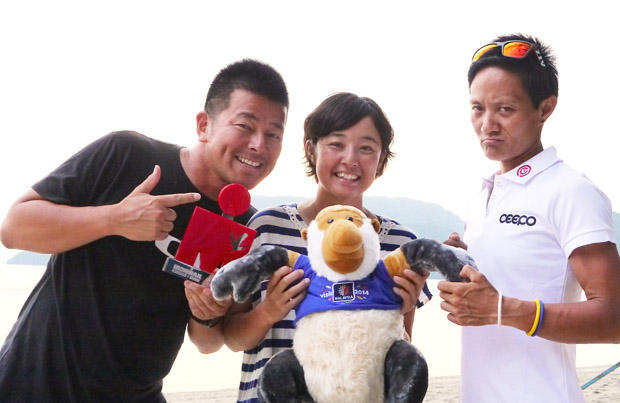
ST: At that race you were 27th overall including the men in a time of 10:12:42. What did that mean to you?
Shiao-Yu: I am glad I did not give up that day. I was behind in swimming, but I never stopped chasing. Some people quit if they think their finish place and time won't be good and it might affect sponsorships. I was not that smart…. I never quit any triathlon races. As long as I am in the game, I have the chance to win.
ST: What did your second straight win at Ironman Japan in 2014 mean to you?
Shiao-Yu: I had another accident after winning Ironman Japan in 2013. I was hit by a motorcycle – again! – while I was training on my bike, and it took months to recover. I was depressed, angry, and unsure if I could win again. When I went to Ironman Japan again I wanted to test myself and see if I had recovered. Before that race, I trained with some male age groupers in Taiwan who would take turns in front of me to keep the speed I needed. I was very thankful and told them I would race again because of them…. When the race started, I thought about my friends and all the people who encouraged me and helped me train. This gave me tremendous power and pushed me to the finish.
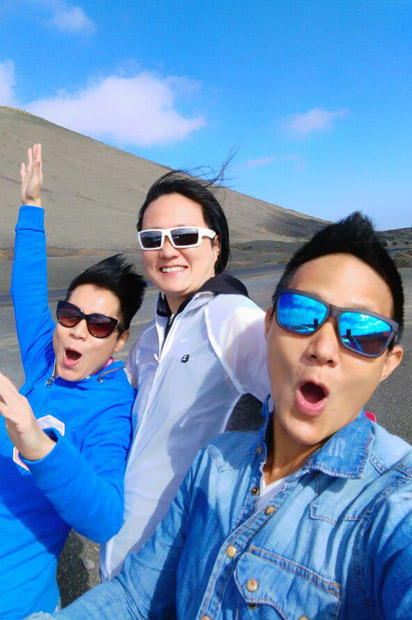
ST: What ambitions do you have for your career?
Shiao-Yu: My goal is to go to Kona again as a pro. Never before has a Taiwanese or Chinese pro, and seldom have any Asian pro athletes, done that. I hope I can win this honor for Taiwan and for Asian athletes.
ST: What difference have you made in life and in sport?
Shiao-Yu: To build a path that no one walked through before – to make the impossible into the possible.
All photographs courtesy of Shiao-Yu Li


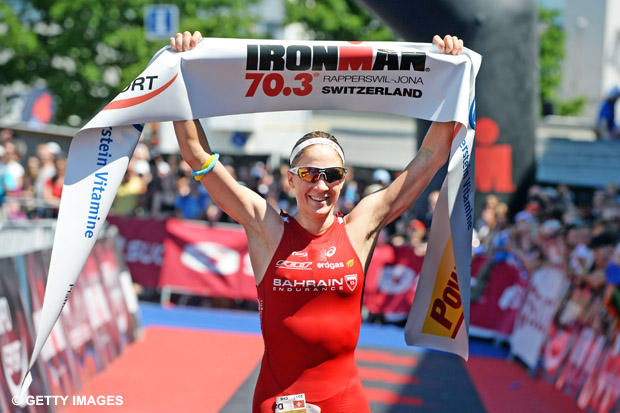
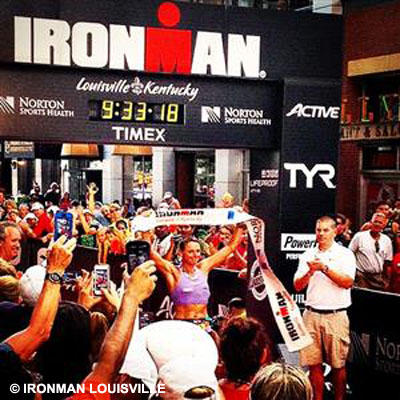
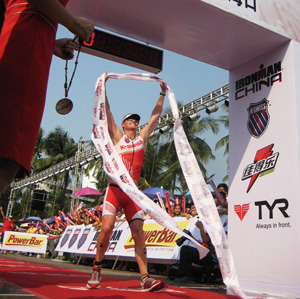
Start the discussion at slowtwitch.northend.network